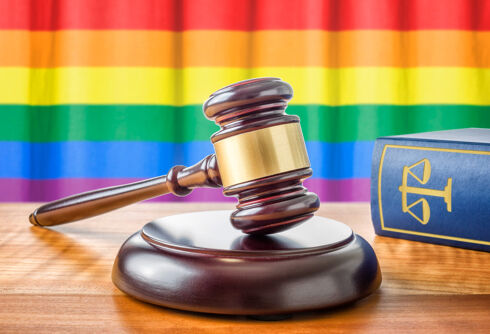A Los Angeles surfing competition cannot exclude transgender women from its women’s division, the California Coastal Commission wrote in a letter to the event’s organizer this week.
“Prohibiting or unfairly limiting transgender athletes from competing in this or any surf competition that takes place in the coastal waters of California does not meet the requirements of the public access policies of the Coastal Act and impedes access by discriminating against transgender surfers,” the commission’s executive director Kate Huckelbridge wrote in the Tuesday letter to American Longboard Association’s Todd Messick, the Los Angeles Times reported.
Related:
Surfer Bethany Hamilton speaks out against new inclusive trans rules
She’s mad she wasn’t consulted.
The letter came after Australian surfer and surfboard designer Sasha Jane Lowerson attempted to enter this year’s Huntington Beach Longboard Pro competition. Lowerson was born intersex and, according to The Inertia, describes herself as a “proud woman with a trans experience.” After competing in men’s events, she became the first out transgender woman to win a longboard competition in 2022 and has worked with Surfing Australia to develop guidelines allowing trans surfers to participate in events and clubs.
Stay connected to your community
Connect with the issues and events that impact your community at home and beyond by subscribing to our newsletter.
Prior to submitting her application and entrance fee for the Huntington Beach competition, Lowerson reached out to Messick to make sure she would be allowed to participate. Messick never responded, and instead posted an April 25 video on Instagram.
“It was brought to my attention yesterday that there’s a transgender athlete that’s entered into the women’s division and it threw me completely off guard,” Messick says in the video. “I didn’t realize I was gonna have to address this this soon, only into our second contest.”
“Right now, we’re going to support biological males and biological females in their divisions respectively,” he continued. “If you were born a female, you enter in the women’s. If you were born a male, you enter in the men’s.”
Lowerson told the BBC this week that she was surprised and disappointed at being excluded from the event. “You can’t cherry-pick the rulebook,” she said. “If you’re going to use the rulebook, you use all of it.”
In his video, Messick claimed that the American Longboard Association’s policy was “very much in line with” those of the International Surfing Association (ISA), when in fact the ISA updated its policies in 2023 with criteria allowing transgender women to participate in women’s events if they maintain certain levels of testosterone. Sabrina Brennan, legislative advocate for Surf Equity, an organization that advocates for inclusion and equality in the sport, reached out to Messick about his apparent misinterpretation of the ISA’s policies. When he failed to respond, she contacted the California Coastal Commission, which regulates the use of coastal land and water in the state.
In Huckelbridge’s May 7 letter, she indicated that she had spoken to Messick earlier that day about the matter and reiterated that not only did his organization’s policy violate California’s Coastal Act, which includes provisions ensuring equal access to the state’s coastline, but also was inconsistent with the ISA and World Surf League’s policies around transgender inclusion.
“In our conversation, you committed to following the ISA Transgender Policy Rule and allowing transgender women to compete in the women’s division if they can demonstrate that they meet the criteria outlined in the ISA policy,” Hucklebridge wrote to Messick.
“Surf contests in state waters must be carried out in a lawful manner that does not discriminate based on gender,” a spokesperson for the California Coastal Commission told the BBC.
According to the Los Angeles Times, Lowerson’s name was not included on a list of surfers competing in Huntington Beach Longboard Pro’s women’s division released on Thursday. Lowerson told The Inertia earlier this week that she had decided not to participate in the event.
Lowerson told the BBC that she disagrees with the argument that trans women possess unfair advantages over cis women. Surfing, she said, is “not a race, it’s about style, flow, grace. As a longboarder, it’s more like ballet on a wave.”
She told The Inertia that she doesn’t aspire to be a professional surfer and doesn’t want to take another athlete’s place in competitions. “I don’t go in them [contests] to win,” she said. “I go in them to hang out and meet people.”
Still, she told the BBC that she’s “inadvertently become a poster child for trans women in surfing.”
“Sport is about community,” Lowerson said. “It’s about sharing and having fun with other like-minded people, and the fact we’re losing sight of that is really sad.”
Don't forget to share:

















